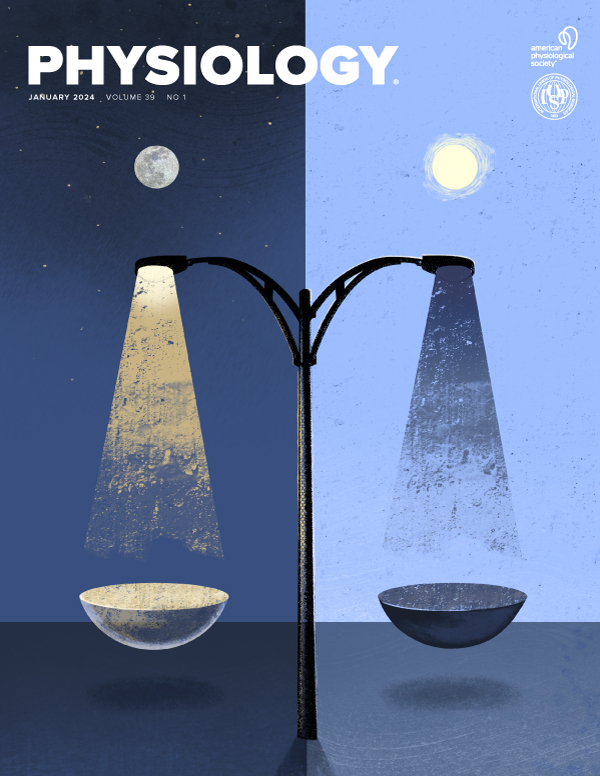肝脏中瞬时 YAP 信号转导的后果
IF 5.3
2区 医学
Q1 PHYSIOLOGY
引用次数: 0
摘要
转录共激活因子 YAP 在肝脏稳态和疾病发展中发挥着复杂的作用。在肝脏损伤和肝毒素作用下,YAP会被短暂激活,通过协调细胞增殖和新陈代谢促进肝脏再生。相比之下,在实验模型中,YAP的慢性激活与肝脏疾病和癌症有关。这些对 YAP 的主要反应已经得到证实,但目前还不清楚急性 YAP 信号转导如何导致肝病的最终发展。在这里,我们利用强力霉素诱导系统控制肝细胞中组成性活性 YAP 突变体的瞬时表达,建立了一个动态 YAP 信号传导的体内模型。我们发现,虽然YAP对肝脏生长和细胞增殖的依赖性影响是可逆的,但即使在YAP失活后,肝脏中的代谢变化仍然保持稳定。通过 RNAseq 和 ATACseq 分析,我们揭示了基因表达和染色质可及性的持续变化,尤其是那些涉及脂质代谢的基因。此外,我们还证明,瞬时 YAP 信号传导会使肝脏受到比正常情况下未经刺激的肝脏更严重的肝损伤。这些数据表明,瞬时 YAP 信号传导会产生一种脂质代谢记忆,从而增加对肝病的易感性。总之,我们目前的工作揭示了急性 YAP 信号传导的长期后果,它可能会影响肝病的发展。5R01HL128850-07 (FC) 和 5T32DK007477-40 (KA)。本文是在 2024 年美国生理学峰会上发表的摘要全文,仅提供 HTML 格式。本摘要没有附加版本或附加内容。生理学》未参与同行评审过程。本文章由计算机程序翻译,如有差异,请以英文原文为准。
Consequences of Transient YAP Signaling in the Liver
The transcriptional co-activator YAP plays a complex role in liver homeostasis and disease development. In response to liver injuries and hepatotoxins, YAP is transiently activated to promote liver regeneration by coordinating cell proliferation and metabolism. By contrast, chronic activation of YAP in experimental models has been associated with liver diseases and cancer. These primary responses to YAP are well established; however, it is presently unknown how acute YAP signaling contributes to the eventual development of liver diseases. Here, we developed an in vivo model of dynamic YAP signaling using a doxycycline-inducible system to control the transient expression of a constitutively active YAP mutant in hepatocytes. We found that while YAP-dependent effects on liver growth and cell proliferation are reversible, there are metabolic changes in the liver that remain stable even after YAP inactivation. By coupling RNAseq and ATACseq analyses, we unraveled persistent changes in gene expression and chromatin accessibility, particularly those involved in lipid metabolism. Furthermore, we demonstrated that transient YAP signaling sensitizes the liver to develop more severe liver injuries than normally induced in an unprimed liver. These data suggest that transient YAP signaling imparts a form of lipid metabolic memory that promotes susceptibility to liver diseases. Overall, our current work reveals long-term consequences of acute YAP signaling that may influence the development of liver diseases. 5R01HL128850-07 (FC) and 5T32DK007477-40 (KA). This is the full abstract presented at the American Physiology Summit 2024 meeting and is only available in HTML format. There are no additional versions or additional content available for this abstract. Physiology was not involved in the peer review process.
求助全文
通过发布文献求助,成功后即可免费获取论文全文。
去求助
来源期刊

Physiology
医学-生理学
CiteScore
14.50
自引率
0.00%
发文量
37
期刊介绍:
Physiology journal features meticulously crafted review articles penned by esteemed leaders in their respective fields. These articles undergo rigorous peer review and showcase the forefront of cutting-edge advances across various domains of physiology. Our Editorial Board, comprised of distinguished leaders in the broad spectrum of physiology, convenes annually to deliberate and recommend pioneering topics for review articles, as well as select the most suitable scientists to author these articles. Join us in exploring the forefront of physiological research and innovation.
 求助内容:
求助内容: 应助结果提醒方式:
应助结果提醒方式:


